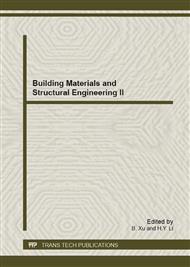[1]
R. Z. Valiev, R. K. Islamgaliev, I. V. Alexandord. Bulk nanostructured materials from severe plastic deformation. Progress in Materials Science. 45(2000)103-189.
DOI: 10.1016/s0079-6425(99)00007-9
Google Scholar
[2]
C. C. Koch. The synthesis and structure of nanocrystalline materials produced by mechanical attrition: a review. Nanostructured Materails. 2(1993)109-129.
DOI: 10.1016/0965-9773(93)90016-5
Google Scholar
[3]
F. Djavanroodi, M. Daneshtalab, M. Ebrahimi. A novel technique to increase strain distribution homogeneity for ECAPed materials. Materials Science and Engineering A. 535(2012)115-121.
DOI: 10.1016/j.msea.2011.12.050
Google Scholar
[4]
T. R. Milind, P. P. Date. Analytical and finite element modeling of strain generated in equal channel angular extrusion. International Journal of Mechanical Sciences. 56(2012)26-34.
DOI: 10.1016/j.ijmecsci.2011.12.002
Google Scholar
[5]
W. J. Kim, J. K. Kim, W. Y. Choo, S. I. hong, J. D. Lee. Large strain hardeningin Ti-V carbon steel processed by equal channel angular pressing. Materials Letters. 51(2001)177-182.
DOI: 10.1016/s0167-577x(01)00320-2
Google Scholar
[6]
S. H. Joo, S. C. Yoon, H. G. Jeong, S. Lee, H. S. Kim. Deformation behavior of consecutive workpieces in equal channel angular pressing of solid dies. Journal of Materials Science. 47(2012)7877-7882.
DOI: 10.1007/s10853-012-6472-5
Google Scholar
[7]
F. Djavanroodi, B. Omranpour, M. Ebrahimin, M. Sedighi. Designing of ECAP parameters based on strain distribution uniformity. Progress in Natural Science: Materials International. 22(2012)452-460.
DOI: 10.1016/j.pnsc.2012.08.001
Google Scholar
[8]
X. N. Zhang, L. Hua, Y. X. Liu. FE simulation and experimental investigation of ZK60 magnesium alloy with different radial diameters processed by equal channel angular pressing. Materials Science and Engineering A. 535(2012)153-163.
DOI: 10.1016/j.msea.2011.12.057
Google Scholar
[9]
G.Y. Denga, C. Lub, L. H. Sub, X. H. Liua, A. K. Tieub. Modeling texture evolution during ECAP of copper single crystal by crystal plasticity FEM. Materials Science and Engineering A. 534(2012)68-74.
DOI: 10.1016/j.msea.2011.11.042
Google Scholar
[10]
R. Kocich, L. Kuncicka, M. Mihola, K. Skotnicova. Numerical and experimental analysis of twist channel angular pressing (TCAP) as a SPD process. Materials Science and Engineering A. 563(2013)86-94.
DOI: 10.1016/j.msea.2012.11.047
Google Scholar
[11]
M. Esmailzadeh, M. A. Kahafri. Finite element and artificial neural network analysis of ECAP. Computational Materials Science. 63(2012)127-133.
DOI: 10.1016/j.commatsci.2012.05.075
Google Scholar
[12]
Y. C. Yuan, A. B. Ma, J. H. Jiang, D. H. Yang. Finite element analysis of the deformation distribution during multi-pass rotary-die ECAP. Journal of Materials Engineering and Performance. 20(2011)1378-1384.
DOI: 10.1007/s11665-011-0042-x
Google Scholar
[13]
M. H. Farshidi, M. Kazeminezhad. Deformation behavior of 6061aluminum alloy through tube channel pressing: severe plastic deformation. Journal of Materials Engineering and Performance. 21(2012)2099-2105.
DOI: 10.1007/s11665-012-0155-x
Google Scholar


